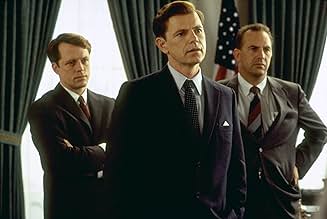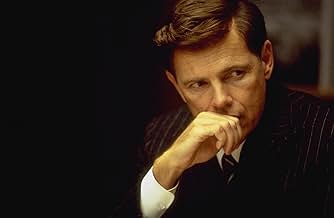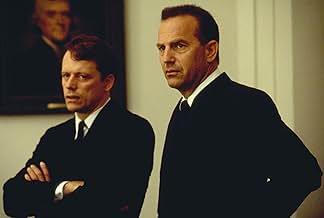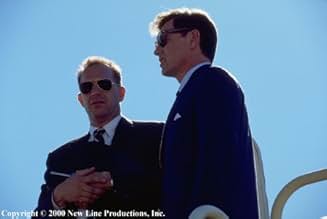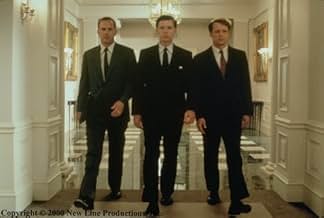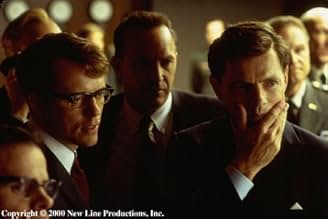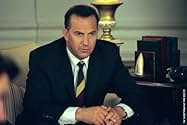Die Dramatisierung der Anstrengungen der Kennedy-Regierung zur Eindämmung der Kubakrise im Oktober 1962.Die Dramatisierung der Anstrengungen der Kennedy-Regierung zur Eindämmung der Kubakrise im Oktober 1962.Die Dramatisierung der Anstrengungen der Kennedy-Regierung zur Eindämmung der Kubakrise im Oktober 1962.
- Regie
- Drehbuch
- Hauptbesetzung
- Auszeichnungen
- 3 Gewinne & 8 Nominierungen insgesamt
Empfohlene Bewertungen
I watched this movie today with a number of students from my International Politics class, and from the standpoint of a politics professor, this film was absolutely extraordinary. This is a movie about the development of foreign policy in a crisis; it spells out with brilliant detail the decision-making process of JFK's inner circle, the tension between the Executive Office of the President and the Departments of State and Defense, and the attempts by the Military Industrial Complex (namely the Joint Chiefs) to undermine the diplomatic approaches favored by the president. It highlights the conflict between military standard operating procedures ("rules of engagement") and the better judgment/common sense of right-thinking human beings. It hints at conspiracies to (later) depose and otherwise get rid of both Kennedy and Khruschev from within for what turned out to be a very unpopular resolution with the hardliners on both sides. I especially like that the movie acknowledged the humanity of the individual decision-makers without getting too Capra-esquire or preachy.
I can see why this film hasn't been a great commercial success. It is not your standard big studio fare. It's quite cerebral, and although it has some exciting pre-conflict scenes, it's not a "war film". (It reminds me a bit of "Three Kings" in that regard- both films were, in my opinion, mis-marketed. They both seemed to target the younger male action crowd, when both movies are really made for a more intellectual audience.) I liked how the Soviets were not cartoonishly vilified, as is common in a lot of Cold War era films. They were shown to be somewhat calculating and strategic, but not irrational or more importantly, inhuman. In fact, one of the most fascinating parts of the film is the revelation that both sides lack information as to the other side's true intentions. It was this uncertainty that back in October 1962, could have led to the end of civilization as we know it.
The acting was solid (Steven Culp was very, very good as Robert Kennedy- so good, in fact, that I'm afraid he'll have a hard time getting cast in the future. There was audible gasp in the audience when he came on the screen and WAS Bobby). Coaster's accent was actually annoying (as an earlier reviewer noted), but it's forgivable in light of the moving, somewhat understated performance he turns in. It is the directing that takes the cake, however. From the moment the chain of events was set in motion, the tension does NOT let up. It actually feels like you are back in 1962 living through the events of those two weeks- honestly, there was nary a moment to relax until the resolution was wrought. I recommend this film especially strongly to high school and college age students who are too young to have any Cold War memory, as well as to those who lived through the era and may have forgotten what it felt like to come this close.
I can see why this film hasn't been a great commercial success. It is not your standard big studio fare. It's quite cerebral, and although it has some exciting pre-conflict scenes, it's not a "war film". (It reminds me a bit of "Three Kings" in that regard- both films were, in my opinion, mis-marketed. They both seemed to target the younger male action crowd, when both movies are really made for a more intellectual audience.) I liked how the Soviets were not cartoonishly vilified, as is common in a lot of Cold War era films. They were shown to be somewhat calculating and strategic, but not irrational or more importantly, inhuman. In fact, one of the most fascinating parts of the film is the revelation that both sides lack information as to the other side's true intentions. It was this uncertainty that back in October 1962, could have led to the end of civilization as we know it.
The acting was solid (Steven Culp was very, very good as Robert Kennedy- so good, in fact, that I'm afraid he'll have a hard time getting cast in the future. There was audible gasp in the audience when he came on the screen and WAS Bobby). Coaster's accent was actually annoying (as an earlier reviewer noted), but it's forgivable in light of the moving, somewhat understated performance he turns in. It is the directing that takes the cake, however. From the moment the chain of events was set in motion, the tension does NOT let up. It actually feels like you are back in 1962 living through the events of those two weeks- honestly, there was nary a moment to relax until the resolution was wrought. I recommend this film especially strongly to high school and college age students who are too young to have any Cold War memory, as well as to those who lived through the era and may have forgotten what it felt like to come this close.
In 1962, the world stood on the brink of World War III for "Thirteen Days," a 2000 film starring Kevin Costner, Bruce Greenwood, Steven Culp and Dylan Baker, with direction by Roger Donaldson. The story concerns the "Cuban Missile Crisis," when the U.S. discovered that the Soviets had placed missiles aimed at the U.S. in Cuba.
As someone who remembers the situation well, watching this was a profound experience in more ways than one. A good deal of dialogue was taken from actual Presidential transcripts, which made watching it even more impressive. Looking at it from today's eyes, "Thirteen Days" is a knockout.
Donaldson focuses the film right where it should be - in the White House and in conference rooms, giving us only the subplot of Kenny O'Donnell's family life. For those posters who commented that O'Donnell was perhaps not a real person, yes, he was. It's impossible for me to believe that with a film that goes into so much detail and strove to be so factual, someone thought there was a made-up character. Try Google next time. Ken O'Donnell headed up Kennedy's presidential campaign and was appointed his Special Assistant when Kennedy won the White House. He was the most powerful of the President's advisers.
Several things become clear about the goings-on at the White House in 1962: None of the military leaders thought the Kennedy administration belonged in the White House; if it had been up to the military leaders, the situation would have caused World War III; JFK turned himself into a pretzel in order to pursue a diplomatic solution to the potential conflict. Though discouraged almost at every turn, JFK still would not allow the shooting to begin, pushing instead for an embargo against Cuba.
There is plenty of tension and excitement in this film. One of the best scenes is Commander Eckerd (Christopher Lawford) and his team low-flying over Cuba taking photos, and a U-2 pilot trying to avoid missiles chasing him. But most of the tension and excitement takes place in the meetings as the President and RFK struggle for answers and play for time. The mix is therefore ideal: drama, some aerial excitement, and a little humor as Adlai Stevenson gets the better of the Russians in an OAS meeting.
There's also a look at the reaction of the country - also very accurate. Yes, people piled into church, cleared the grocery shelves of everything, and stocked fallout shelters. We all watched the President on television. In fact, as he talked, my mother thought he was about to declare war. It was a terrifying time.
Kenny O'Donnell's role in all of this may have been somewhat exaggerated to make it a palatable role for Kevin Costner. Costner does okay in the part. Boston accents are very difficult to do without them sounding put on. It's very difficult to do accents in general and make them organic to the character. A few have succeeded: Anne Bancroft in "The Miracle Worker," Paul Newman in "Somebody Up There Likes Me," little Natalie Wood in "Tomorrow is Forever," Travolta in "Saturday Night Fever," and of course there are others. Jane Seymour and Joan Collins can easily pull off being Americans. All British actors can do a southern accent, since the southern accent started off as a British accent. Costner lays it on too thick and it's a distraction. But he certainly isn't bad in the role.
The casting people merely wanted to suggest JFK and RFK. In Steven Culp, they found a young actor with similar features to RFK. He does an effective job, given that it's tough going to portray such a famous person. The most successful in the film is Bruce Greenwood as JFK, who tries to keep the accent from overpowering the dialogue. In the President's television speech, I'm sure he imitated JFK's every single inflection and pause, and it's perfect. His JFK is a listener, very dependent on his brother's advice, and one who takes the burdens of the country on his shoulders like a cross. One of the posters here mentioned something to the effect that "we are led to believe that JFK leaned heavily on his advisors" as if this is a negative. Of course he did. Of course any President does or should. The final decisions belonged to him, and he had to be sure of all of the ramifications. Only an idiot doesn't hear every single opinion of value before he decides to launch World War III.
The camaraderie between RFK, JFK, and O'Donnell is as unmistakable as their arguments and frustrations.
Thirteen months after the Cuban Missile Crisis, JFK would be dead and O'Donnell would be riding behind him in the Secret Service Car. After a particularly tough meeting with the Joint Chiefs of Staff, O'Donnell insists that JFK sit for a minute, and JFK finally does. Worn out and not sleeping well, he laments about being President. "I just thought there would be more good days." In the end, we - and he - would have settled for just MORE days.
As someone who remembers the situation well, watching this was a profound experience in more ways than one. A good deal of dialogue was taken from actual Presidential transcripts, which made watching it even more impressive. Looking at it from today's eyes, "Thirteen Days" is a knockout.
Donaldson focuses the film right where it should be - in the White House and in conference rooms, giving us only the subplot of Kenny O'Donnell's family life. For those posters who commented that O'Donnell was perhaps not a real person, yes, he was. It's impossible for me to believe that with a film that goes into so much detail and strove to be so factual, someone thought there was a made-up character. Try Google next time. Ken O'Donnell headed up Kennedy's presidential campaign and was appointed his Special Assistant when Kennedy won the White House. He was the most powerful of the President's advisers.
Several things become clear about the goings-on at the White House in 1962: None of the military leaders thought the Kennedy administration belonged in the White House; if it had been up to the military leaders, the situation would have caused World War III; JFK turned himself into a pretzel in order to pursue a diplomatic solution to the potential conflict. Though discouraged almost at every turn, JFK still would not allow the shooting to begin, pushing instead for an embargo against Cuba.
There is plenty of tension and excitement in this film. One of the best scenes is Commander Eckerd (Christopher Lawford) and his team low-flying over Cuba taking photos, and a U-2 pilot trying to avoid missiles chasing him. But most of the tension and excitement takes place in the meetings as the President and RFK struggle for answers and play for time. The mix is therefore ideal: drama, some aerial excitement, and a little humor as Adlai Stevenson gets the better of the Russians in an OAS meeting.
There's also a look at the reaction of the country - also very accurate. Yes, people piled into church, cleared the grocery shelves of everything, and stocked fallout shelters. We all watched the President on television. In fact, as he talked, my mother thought he was about to declare war. It was a terrifying time.
Kenny O'Donnell's role in all of this may have been somewhat exaggerated to make it a palatable role for Kevin Costner. Costner does okay in the part. Boston accents are very difficult to do without them sounding put on. It's very difficult to do accents in general and make them organic to the character. A few have succeeded: Anne Bancroft in "The Miracle Worker," Paul Newman in "Somebody Up There Likes Me," little Natalie Wood in "Tomorrow is Forever," Travolta in "Saturday Night Fever," and of course there are others. Jane Seymour and Joan Collins can easily pull off being Americans. All British actors can do a southern accent, since the southern accent started off as a British accent. Costner lays it on too thick and it's a distraction. But he certainly isn't bad in the role.
The casting people merely wanted to suggest JFK and RFK. In Steven Culp, they found a young actor with similar features to RFK. He does an effective job, given that it's tough going to portray such a famous person. The most successful in the film is Bruce Greenwood as JFK, who tries to keep the accent from overpowering the dialogue. In the President's television speech, I'm sure he imitated JFK's every single inflection and pause, and it's perfect. His JFK is a listener, very dependent on his brother's advice, and one who takes the burdens of the country on his shoulders like a cross. One of the posters here mentioned something to the effect that "we are led to believe that JFK leaned heavily on his advisors" as if this is a negative. Of course he did. Of course any President does or should. The final decisions belonged to him, and he had to be sure of all of the ramifications. Only an idiot doesn't hear every single opinion of value before he decides to launch World War III.
The camaraderie between RFK, JFK, and O'Donnell is as unmistakable as their arguments and frustrations.
Thirteen months after the Cuban Missile Crisis, JFK would be dead and O'Donnell would be riding behind him in the Secret Service Car. After a particularly tough meeting with the Joint Chiefs of Staff, O'Donnell insists that JFK sit for a minute, and JFK finally does. Worn out and not sleeping well, he laments about being President. "I just thought there would be more good days." In the end, we - and he - would have settled for just MORE days.
Basically this movie is a great history lesson. If you want to know more about the cold war and the Cuba missile crisis in particular this is a perfect medium for you to start with. The movie is quite detailed and accurate even though of course some moments and characters have been 'over-dramatized' for the good of the movie and its flow and emotions.
Even though you already know from start till finish how this movie is going to end, it still is a tense movie to watch. The story is build up well and makes the movie really interesting and compelling to follow. It perfectly captures the tension of the whole crisis and really makes you realize how close the world actually came to a WW III. It makes us aware of the fact that those 13 days in history should always be remembered and used as a lesson for the entire world now and forever. It's too bad that the movie becomes a bit too moralistic at times, especially toward the ending.
Bruce Greenwood doesn't really look like JFK but he's a good actor, so he becomes believable enough in his role trough his acting skills. Steven Culp really does look like Robert Kennedy and on top of that he also is a great actor. I wasn't always happy with Kevin Costner performance but overall he did an acceptable job. There are some weaker moments which involves his character but I more blame those moments to the at times too moralistic written script.
A bit of a disappointing aspect of the whole movie is its style. Roger Donaldson at times tries to be over-artistic and mixes the movie with black & white and color images. Perhaps he tried to copy Oliver Stone's style? Who knows. The cinematography was also disappointingly standard but thankfully the good editing saved this a little. Also the musical score by Trevor Jones is surprisingly solid.
Overall it's a very good political movie that has some great tense and important moments in it and also works great as a history lesson.
8/10
http://bobafett1138.blogspot.com/
Even though you already know from start till finish how this movie is going to end, it still is a tense movie to watch. The story is build up well and makes the movie really interesting and compelling to follow. It perfectly captures the tension of the whole crisis and really makes you realize how close the world actually came to a WW III. It makes us aware of the fact that those 13 days in history should always be remembered and used as a lesson for the entire world now and forever. It's too bad that the movie becomes a bit too moralistic at times, especially toward the ending.
Bruce Greenwood doesn't really look like JFK but he's a good actor, so he becomes believable enough in his role trough his acting skills. Steven Culp really does look like Robert Kennedy and on top of that he also is a great actor. I wasn't always happy with Kevin Costner performance but overall he did an acceptable job. There are some weaker moments which involves his character but I more blame those moments to the at times too moralistic written script.
A bit of a disappointing aspect of the whole movie is its style. Roger Donaldson at times tries to be over-artistic and mixes the movie with black & white and color images. Perhaps he tried to copy Oliver Stone's style? Who knows. The cinematography was also disappointingly standard but thankfully the good editing saved this a little. Also the musical score by Trevor Jones is surprisingly solid.
Overall it's a very good political movie that has some great tense and important moments in it and also works great as a history lesson.
8/10
http://bobafett1138.blogspot.com/
Poor Kevin Costner. I get the feeling that he just can't win no matter what he does. He gets slammed for being in films and not using an appropriate accent. Need we look any further than 'Robin Hood: Prince of Thieves'? When he does use an accurate accent, as he does in 'Thirteen Days,' he gets slammed for trying to elevate his game to a playing field dominated by more well liked method actors. I've heard an argument before that he should just stick to making westerns since, allegedly, they're the only films that he does well. Many would immediately argue that 'Wyatt Earp' cancels out 'Dances With Wolves.' I argue instead that people are just too hard on Kevin Costner and 'Thirteen Days' is a very good example of why he deserves a bit of a break.
'Thirteen Days' was the fastest two and a half hours that I've sat through in a long time. The film was absolutely engrossing and very tense. Everyone knows what happens (or should be able to infer it since we'd all be dead right now if things hadn't worked out so well) but the writing and direction deserve great credit. They were able to transfer the tension from the historical situation and bring it to the screen with electricity. I think it works brilliantly well for two main reasons: 1. The viewer may know what is going to happen, but the characters don't. They are stressed, terrified and at the breaking point. One wrong move and the whole world is obliterated. If that isn't good drama, I don't know what is. 2. The film makers very wisely resisted the impulse to try and show things from the Soviet point of view. The strength of the film is the peril of the situation and the terror of not knowing what the other guy is trying to do. By filming from solely an American perspective and keeping both the characters and audience in the dark, this character driven movie excels.
A second brilliant strategy employed by the film makers was in the casting. With the exception of Costner, there are no real stars. Instead there are more reliable, hard-working and chameleon-like character actors. Len Cariou, Dylan Baker, Stephen Culp, and Bruce Greenwood are just a small sampling. Greenwood plays JFK and excellently plays a man desperate for peace but surrounded by calls for swift military action. He sees the bigger picture where others don't, but may not be able to navigate the smaller picture without help. Dylan Baker is a doppelganger and his performance as McNamara is spot on.
Highly recommended.
'Thirteen Days' was the fastest two and a half hours that I've sat through in a long time. The film was absolutely engrossing and very tense. Everyone knows what happens (or should be able to infer it since we'd all be dead right now if things hadn't worked out so well) but the writing and direction deserve great credit. They were able to transfer the tension from the historical situation and bring it to the screen with electricity. I think it works brilliantly well for two main reasons: 1. The viewer may know what is going to happen, but the characters don't. They are stressed, terrified and at the breaking point. One wrong move and the whole world is obliterated. If that isn't good drama, I don't know what is. 2. The film makers very wisely resisted the impulse to try and show things from the Soviet point of view. The strength of the film is the peril of the situation and the terror of not knowing what the other guy is trying to do. By filming from solely an American perspective and keeping both the characters and audience in the dark, this character driven movie excels.
A second brilliant strategy employed by the film makers was in the casting. With the exception of Costner, there are no real stars. Instead there are more reliable, hard-working and chameleon-like character actors. Len Cariou, Dylan Baker, Stephen Culp, and Bruce Greenwood are just a small sampling. Greenwood plays JFK and excellently plays a man desperate for peace but surrounded by calls for swift military action. He sees the bigger picture where others don't, but may not be able to navigate the smaller picture without help. Dylan Baker is a doppelganger and his performance as McNamara is spot on.
Highly recommended.
The 1962 Cuban Missile Crisis seen through the eyes of President assistant Kenny O'Donnell (Kevin Costner who hands perfectly the role )as trusted confidante and with significance importance of Robert Kennedy ( Steven Culp who bears remarkable resemblance )and of course President John F . Kennedy ( a solid Bruce Greenwood ) . This interesting film widely develops the Cuban Missile Crisis that was a confrontation between the Soviet Union, Cuba and the United States in October 1962, during the Cold War. The picture is packed with suspense , drama , historical deeds and is quite entertaining . It's correctly based on facts and the few sacrifices of accuracy are realized in the sense of of dramatic license . The motion picture is very well directed by Roger Donaldson who formerly worked with Costner in another suspenseful movie and also plenty of political intrigue titled ¨No way out (87) ¨ .
Adding more details over the widely depicted on the movie the events happened of the following manner : In September 1962, the Cuban and Soviet governments began to surreptitiously build bases in Cuba for a number of medium- and intermediate-range ballistic nuclear missiles (MRBMs and IRBMs) with the ability to strike most of the continental United States. This action was subsequent to the 1958 deployment of Thor IRBMs in the UK and Jupiter IRBMs to Italy and Turkey in 1961; more than 100 U.S.-built missiles having the capability to strike Moscow with nuclear warheads. On October 14, 1962, a United States U-2 photo-reconnaissance plane captured photographic proof of Soviet missile bases under construction in Cuba.The ensuing crisis ranks with the Berlin Blockade as one of the major confrontations of the Cold War and is generally regarded as the moment in which the Cold War came closest to turning into a nuclear conflict .The US President ( Bruce Greenwood) , Attorney General Robert Kennedy (Steven Culp ),State Secretary Robert McNamara ( Dylan Baker ) and his military staff ( Bill Smitrovich , Ed Lauter , James Karen , Len Cariou) and general Curtis LeMay (Kevin Conway ) considered attacking Cuba via air and sea and settled on a "quarantine" of Cuba. The U.S. announced that it would not permit offensive weapons to be delivered to Cuba and demanded that the Soviets dismantle the missile bases already under construction or completed in Cuba and remove all offensive weapons. The Kennedy administration held a slim hope that the Kremlin would agree to their demands, and expected a military confrontation. On the Soviet end, Nikita Khrushchev wrote Kennedy that his quarantine of "navigation in international waters and air space to constitute an act of aggression propelling humankind into the abyss of a world nuclear-missile war." Fidel Castro encouraged Khrushchev to launch a preemptive first-strike nuclear attack on the U.S. The Soviets publicly balked at the U.S. demands, but in secret back-channel communications initiated a proposal to resolve the crisis. The confrontation ended on October 28, 1962 when President John F. Kennedy and United Nations Secretary-General U Thant reached an agreement with Soviet Premier Nikita Khrushchev to dismantle the offensive weapons and return them to the Soviet Union, subject to United Nations verification, in exchange for an agreement by the United States to never invade Cuba. The Soviets removed the missile systems and their support equipment, loading them onto eight Soviet ships from November 5–9. A month later, on December 5 and 6, the Soviet IL-28 bombers were loaded onto three Soviet ships and shipped back to Russia. The quarantine was formally ended previously on November 20, 1962. As a secret part of the agreement, all US-built Thor and Jupiter IRBMs deployed in Europe were deactivated by September 1963.The Cuban Missile Crisis spurred the creation of the Hotline Agreement and the Moscow-Washington hot line, a direct communications link between Moscow and Washington .
Adding more details over the widely depicted on the movie the events happened of the following manner : In September 1962, the Cuban and Soviet governments began to surreptitiously build bases in Cuba for a number of medium- and intermediate-range ballistic nuclear missiles (MRBMs and IRBMs) with the ability to strike most of the continental United States. This action was subsequent to the 1958 deployment of Thor IRBMs in the UK and Jupiter IRBMs to Italy and Turkey in 1961; more than 100 U.S.-built missiles having the capability to strike Moscow with nuclear warheads. On October 14, 1962, a United States U-2 photo-reconnaissance plane captured photographic proof of Soviet missile bases under construction in Cuba.The ensuing crisis ranks with the Berlin Blockade as one of the major confrontations of the Cold War and is generally regarded as the moment in which the Cold War came closest to turning into a nuclear conflict .The US President ( Bruce Greenwood) , Attorney General Robert Kennedy (Steven Culp ),State Secretary Robert McNamara ( Dylan Baker ) and his military staff ( Bill Smitrovich , Ed Lauter , James Karen , Len Cariou) and general Curtis LeMay (Kevin Conway ) considered attacking Cuba via air and sea and settled on a "quarantine" of Cuba. The U.S. announced that it would not permit offensive weapons to be delivered to Cuba and demanded that the Soviets dismantle the missile bases already under construction or completed in Cuba and remove all offensive weapons. The Kennedy administration held a slim hope that the Kremlin would agree to their demands, and expected a military confrontation. On the Soviet end, Nikita Khrushchev wrote Kennedy that his quarantine of "navigation in international waters and air space to constitute an act of aggression propelling humankind into the abyss of a world nuclear-missile war." Fidel Castro encouraged Khrushchev to launch a preemptive first-strike nuclear attack on the U.S. The Soviets publicly balked at the U.S. demands, but in secret back-channel communications initiated a proposal to resolve the crisis. The confrontation ended on October 28, 1962 when President John F. Kennedy and United Nations Secretary-General U Thant reached an agreement with Soviet Premier Nikita Khrushchev to dismantle the offensive weapons and return them to the Soviet Union, subject to United Nations verification, in exchange for an agreement by the United States to never invade Cuba. The Soviets removed the missile systems and their support equipment, loading them onto eight Soviet ships from November 5–9. A month later, on December 5 and 6, the Soviet IL-28 bombers were loaded onto three Soviet ships and shipped back to Russia. The quarantine was formally ended previously on November 20, 1962. As a secret part of the agreement, all US-built Thor and Jupiter IRBMs deployed in Europe were deactivated by September 1963.The Cuban Missile Crisis spurred the creation of the Hotline Agreement and the Moscow-Washington hot line, a direct communications link between Moscow and Washington .
Wusstest du schon
- WissenswertesPresident John F. Kennedy very frequently set up recording machines during meetings at the White House. Much of the dialogue from the movie is taken directly from Kennedy's tapes.
- PatzerPresident Kennedy wanted an eyewitness account so badly that Commander Ecker was ordered to the Pentagon to brief the Joint Chiefs of Staff immediately after landing his RF-8A Crusader, sweaty flight suit and all. This is often thought to be a glaring error in the movie, but his attire is absolutely accurate. Cdr. Ecker was not even allowed to exit his Crusader when he landed at NAS Cecil Field, Jacksonville FL. His film canisters were unloaded from his aircraft, he was refueled and sent immediately to Washington D.C., landing at Andrews AFB and whisked by limousine directly to the Pentagon where he met with the Joint Chiefs of Staff, apologizing right away for appearing at the briefing in his sweat-soaked flight suit. Cdr. Ecker, parched from the Cuba overflight and then the flight north to Washington, asked in a hoarse voice for a drink of water when he arrived. He refuses it in the movie.
- Zitate
Kenny O'Donnell: If the sun comes up tomorrow, it is only because of men of good will. And that's - that's all there is between us and the devil.
- VerbindungenEdited from Trinity and Beyond: The Atomic Bomb Movie (1995)
Top-Auswahl
Melde dich zum Bewerten an und greife auf die Watchlist für personalisierte Empfehlungen zu.
Details
- Erscheinungsdatum
- Herkunftsland
- Sprachen
- Auch bekannt als
- Trece días
- Drehorte
- Produktionsfirmen
- Weitere beteiligte Unternehmen bei IMDbPro anzeigen
Box Office
- Budget
- 80.000.000 $ (geschätzt)
- Bruttoertrag in den USA und Kanada
- 34.592.089 $
- Eröffnungswochenende in den USA und in Kanada
- 46.668 $
- 25. Dez. 2000
- Weltweiter Bruttoertrag
- 66.579.890 $
- Laufzeit
- 2 Std. 25 Min.(145 min)
- Farbe
- Sound-Mix
- Seitenverhältnis
- 1.85 : 1
Zu dieser Seite beitragen
Bearbeitung vorschlagen oder fehlenden Inhalt hinzufügen







